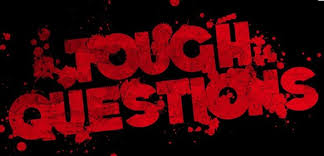 Be aware of your blind spot.
Be aware of your blind spot.
If you ever took driver’s ed classes, you were probably taught about the blind spot in a car. This is the field of vision you do not have access to when sitting in the driver’s seat and looking out your side view mirrors. If you’re changing lanes, you may not see a car beside you because it’s out of range of your mirrors.
There are high-tech vehicles available today that address the blind spot, but it’s still safest to physically turn your head and check to make sure all is clear before moving into a different lane of traffic. Plenty of accidents occur because people don’t check their blind spot.
Did you know that there are blind spots in your view of your relationship too?
Some blind spots are the things we haven’t really thought about or considered before. Other times, they are simply beyond comprehension– we just don’t see because we’ve never experienced it. And other times, we don’t want to look at a situation or dynamic. We intentionally avoid, deny and focus on anything else…even though we know we probably should pay attention.
When trying to rebuild trust after an emotional affair, any of these blind spots can come up. If you’re working to repair the damage and re-connect with your partner but you aren’t feeling the improvements you’d like, your own blind spots could be the reason why.
There is so much to think about as you pick up the pieces of your relationship and it could be that you’re focused in on some areas but not aware of others. This is also likely to be a strange and new place for you. Maybe you’ve never been through an emotional affair before and you don’t really know what’s best.
And, of course, there’s the possibility that, deep down inside, you know there are habits you would be better off facing and dealing with, but you simply don’t want to. You try to ignore the questions nagging at the edge of your mind because you really don’t want to go there. It’s too painful or even scary. It seems somehow easier to fix your attention and efforts on other areas.
We invite you to find the courage to acknowledge what your blind spots are when it comes to healing and moving forward after the emotional affair. Asking the tough questions after an affair is an effective way to do this.
Be sure to examine these “blind spot” areas with as much kindness and compassion as you can. Always remind yourself that your intention is to learn and understand so that you can heal trust. Rather than searching for people to blame and someone to be the “bad” one, be willing to uncover what needs to be uncovered so that you and your partner can return to trusting and loving one another fully.
Gentle and powerful questions to ask yourself…
“How do I react when I feel suspicious or mistrust?”
“Which of my habits puts distance in my relationship?”
“What do I say or do that seems to push my partner away from me?”
“What are some alternatives to my usual reactions and habits that are doable, feel genuine and would benefit me and my relationship?”
Gentle and powerful questions to ask your partner…
“Are you willing to work with me to rebuild trust in our relationship?”
“What is one specific thing I could do differently to make it safer for you to be completely open and honest with me?”
“Will you agree to ________ to strengthen trust?”
What’s essential to remember is your ultimate goal: To rebuild trust and move closer to your partner. When you go to your partner – at a time when you both can focus and are calm – and you aren’t coming from a place of resentment, bitterness or sarcasm, you will find that questions like these help you communicate and better understand one another. Working together to find the next best step is easier.
Be willing to own your role in whatever dynamics pulled you apart and possibly contributed to your relationship being vulnerable to an affair (this may still be pulling you apart today). The set of questions above to ask yourself are tools to use to uncover that. Share with your partner your plan to change your own behavior when you ask him or her the second set of questions. Remember, owning your role doesn’t mean that your partner is “off the hook” for the emotional affair.
The less that either of you is on guard and defensive, the better chance you’ll have of moving beyond the painful past.
 Susie and Otto Collins are experienced relationship coaches who have helped individuals and couples heal the damage caused by infidelity and re-gain trust, love and connection. Click here for more on Susie and Otto’s Relationship Breakthrough Coaching options.
Susie and Otto Collins are experienced relationship coaches who have helped individuals and couples heal the damage caused by infidelity and re-gain trust, love and connection. Click here for more on Susie and Otto’s Relationship Breakthrough Coaching options.

20 replies to "Why It’s Important to Ask the Tough Questions After an Affair"
I never notice the author of a post, but I can spot a Susie and Otto after about 30 seconds of reading, lol.
True, they do have a certain style, don’t they? I think this is a pretty good article though.
Maybe I’ve never been through an emotional affair before and don’t know what’s best???? Really…..I’ve been thrown over a cliff by my partner and NO I don’t know what’s best!!! I don’t know why this article hits a raw nerve, but it does.
I don’t think that anybody knows what’s best when they’ve been blindsided by an affair. To be honest, there probably is no “best” way that fits everyone and every situation. There will be a lot of trial and error, mistakes and successes, that a couple will experience while trying to recover. There’s a lot of information out there from a ton of experts, etc. and you just have to sift through the stuff that you think might work and toss out the rest. That said, If you’re not experiencing any improvement, sometimes you have to go outside of your comfort zone and throw caution to the wind and try things that may seem a little bit risky.
Doug,
I’m not sure what set my teeth on edge regarding this article but it could be the fact, that a few hours previous to reading it, we had another one of those long painful conversations about him not answering my questions regarding the EA.
One is so devastated by their partner’s betrayal that calmly looking for blind-spots isn’t even a possibility…..just not up for that yet.
I understand completely, SI. Not everyone is at a place where they can discuss their “blind spots” yet. And certainly if the CS won’t answer questions or otherwise talk about their affair and/or their feelings it really isn’t possible.
“If you’re not experiencing any improvement, sometimes you have to go outside of your comfort zone and throw caution to the wind and try things that may seem a little bit risky.”
Well said, Doug.
I just read an article by Erica Andersen on Forbes (dot) com titled “How To Get Good At Things By Being Bad First”. Obviously, it isn’t an article about infidelity, but it was an interesting take on how we respond to difficulties, and how we learn and grow as individuals. It’s my belief you (universal) can learn a lot about human nature by reading about it in areas that have nothing to do with affairs…plus it gives you an opportunity to expand your perspective and perhaps challenge the way you talk to yourself in a less painfully charged environment.
Taking a chance and allowing myself to look at things differently was a major factor in overcoming the turmoil I initially experienced due to the choices my H had made. I learned first-hand that things aren’t always as they first appear to be. Staying open to learning more about what makes you and others tick leads to compassion, which leads to genuine intimacy. If I had only listened to the naysayers, I’m certain neither of us would have made much progress toward healing our individual pain or our relationship. We readily admit there was room for individual improvement, that we had gotten sloppy with the other’s feelings, that we had become complacent within our marriage. Life had just gotten in the way and we didn’t have the tools or the knowledge to deal with it. Now we do.
I’m not ashamed to admit I could have done things better before, during, and after the affair. It doesn’t scare me to acknowledge my shortcomings. It doesn’t make me ‘less than’…on the contrary, it frees me up to continue to want to be better than I was before. I don’t want to stay the same. I want to grow, to learn, to expand my awareness. Not to do so would be making a decision to settle with my life and admitting that I didn’t deserve more out of life. I might as well tell myself the best is behind me. Well, guess what? I’m going for the brass ring! I am not wasting this opportunity. I know that growth doesn’t happen when life is easy. It’s the challenges life presents to you that force you out of your comfort zone. That’s when you find out who you truly are and how much you value yourself. That’s the bottom line for everyone on each side of this triangle…learning to value yourself. We all just want to be loved and we’re all looking for it outside ourselves. Maybe we need to allow a different perspective to show us the way.
Well said Blueskyabove!
I know what sets my teeth on edge. I think we have all read enough to know that it was the Cheater’s issues that caused the affair–whatever excuse they invented to justify it. This couple repeatedly tells us, the betrayed ones, to examine what the betrayed spouse did to pull the relationship apart and contributed to the relationship being vulnerable to an affair. Really??
Doug, the article itself is fine. Except for the context of being directed to a group of people on an affair recovery site. I think you have said the majority of readers on EAJ are betrayed spouses. So, yes, most of them will be disturbed by the article, possibly without knowing exactly why.
Most cheaters would probably like this article. I mean, it redirects the blame for any adultery from the cheater to both parties, by saying they all need to address their “blind spots”. I’m taking this to mean that each person is to basically look at their own inadequacies, not those of the other person.
For example, this line is complete Doublespeak, in my mind. “Remember, owning your role doesn’t mean that your partner is “off the hook” for the emotional affair”. Really??? This is what is distasteful. It misdirects 100% of making the decision to have an inappropriate relationship outside your marriage from the cheater. I’m not saying anyone has a perfect marriage, ever. You are dealing with two separate issues, really. Marriage is one. Infidelity is it’s own issue, in my opinion. Never blame infidelity on the marriage, or your partner. It is 100% for the cheater to own. Always.
Absolutely spot on Giz. I have read tons of books, boards, blogs, articles… You name it!! This couple so consistently misses the mark it’s unbelievable. When they DO make a good point, it seems like an accident. Enough said.
Couldn’t agree more.
You know what’s my role was in our marriage train wreck – not telling my CS to kiss my a$$ and get the hell out when he was acting like a world class jack-wagon. I knew he was up to no good. My gut was wrenching with the knowledge but I fell for his “you’re crazy” talk time and time again. Our marriage had issues like every marriage but my H was too busy worrying about soothing his mid-life crisis and revisiting his teenage years on social media. My blind spot was not believing in myself and following my gut!
Why does it seem, that usually, the betrayed spouse pays the higher price, for something that only the cheating spouse enjoyed? Do we have any choice that does not scar our soul?
How much does it cost us to stay? Or to go?
What part of ourselves must we bury, deny, give away if we choose to stay?
Will compromising allow us to ever be whole again?
We don’t have the luxury of being able to choose without considering the cost outside of ourselves.
The cheater made choices without this burden. He made choices that only benefitted himself. The cost to himself was little or nothing.
Deciding to end the marriage is not focused on solely on me. We MUST consider the cost not only to ourself, but to our children (family), our future.
The cost of moving on is immeasurable.
The cheater will filter out the the unpleasant data. He will choose not to remember.
We can never forget.